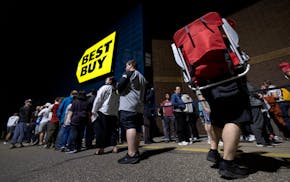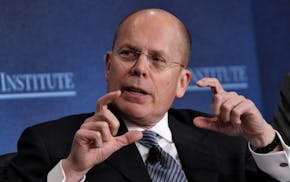My first birthday freebie cost me $4.88. I needed a cup of coffee to wash down my free pastry. Then I decided to add some protein to the most important meal of the day and ordered an egg sandwich.
There's no such thing as a free breakfast, I guess.
For bargain hunters, birthdays can be a major score. That is, if you plan ahead and make rational money decisions devoid of emotion and desire. Good luck with that.
Ever since Daniel Kahneman won the Nobel Prize for economics in 2002 for his work on the psychology of decisionmaking, the field of behavioral economics has exploded with research on why humans make the stupid money decisions that we do. The overarching conclusion is that we're irrational and emotional, and we prove that's true many times over when we shop, spend and save.
After my experience redeeming this year's inbox full of birthday offers, I think I would have made a great subject for these kinds of studies.
Although I was determined to be rational and savvy, I consumed calories that I didn't need. I drove out of my way to trade a coupon for lunch. I took my entire family out to dinner so I could eat a free burger that I ultimately didn't want. And I contemplated buying a pair of unwanted shoes so I wouldn't waste a $5 gift certificate.
I managed to redeem just one birthday offer without spending a penny. Many offers littering my inbox went to waste, but they honestly weren't worth the paper they'd be printed on.
Disciplined deal-seekers reading this may be more curious about how I found all these freebies than about all of my missteps. Several blogs catalog birthday deals. A quick Google search will yield an array of appealing offers. Most of these offers require consumers to sign up with the retailer or restaurant. I'm not concerned about a messy inbox, but if you're hesitant to clog yours with spam for the 364 days of the year when you aren't celebrating, you can create a separate e-mail address for offers. Try to sign up a few weeks before your birthday so you don't miss out.
At first glance, it seems the list of free meals, fancy coffee drinks and desserts could keep your wallet flush and belly stuffed for days. But a more scrutinizing read will uncover the catches. Free dessert if you buy a meal. A free meal if you buy a full-price entree for someone else. A $10 gift valid if you spend $50. Unless these offers come from a favorite brand, I ignore any promise of something free with a purchase. What kind of gift is that?
After I separate the fakes from the true freebies, I check the fine print. Some gifts expired on my actual birthday. A drink from Caribou Coffee, for example. Starbucks, on the other hand, gives more time to redeem a treat. Next, I make a redemption plan, keeping in mind that some deals will grace my inbox the first day of my birthday month.
A free noodle bowl from Noodles and Company is a well-known birthday benefit. But don't forget to look around for lesser-known, nonedible offers. This year, I received a free stock trade from Sharebuilder. In the past, Sephora gave me free beauty products.
Now why would some businesses offer such rich perks? For one, a good gift separates them from the "free slice of cake with purchase" crowd, increasing the odds that I'll walk in the door. Once I'm in, chances are good that I'll redeem my free goody — and spend some additional cash. (Exhibit A: My birthday breakfast experience.) After the memory of that no-cost perk fades, the business still has some of my personal information and my e-mail address. That's worth more to the business' marketers than a free sandwich, isn't it?
If, after reading this, the allure of a free cookie is still too great to resist, try to hold onto the following advice as you resolve to remain rational at the cash register: If you have to spend money to redeem a free offer, it's not free. Common sense, yes. But it had to be said.
Cost isn't just about money. Time, hassle and health are considerations, too. In other words, what's the cost of a weekend's worth of free yet calorie-rich meals that derail your diet?
Like any transaction in this data-driven age, that freebie was provided in return for your e-mail address, birth date and other valuable personal information. You need to decide if trading your personal information for discounts is a fair deal, or at least one you're willing to live with.
Kara McGuire is a personal finance expert and consumer strategist for CEB. Send questions, comments or future column ideas to kara@karamcguire.com.

UnitedHealth sues the Guardian, alleging defamation in coverage of nursing home care

Prices for international flights drop as major airlines navigate choppy economic climate
Minnesota's med spa industry rises in popularity — and with little regulation

Hundreds line up at Best Buy to nab Nintendo Switch 2, in scene like '90s opening parties

